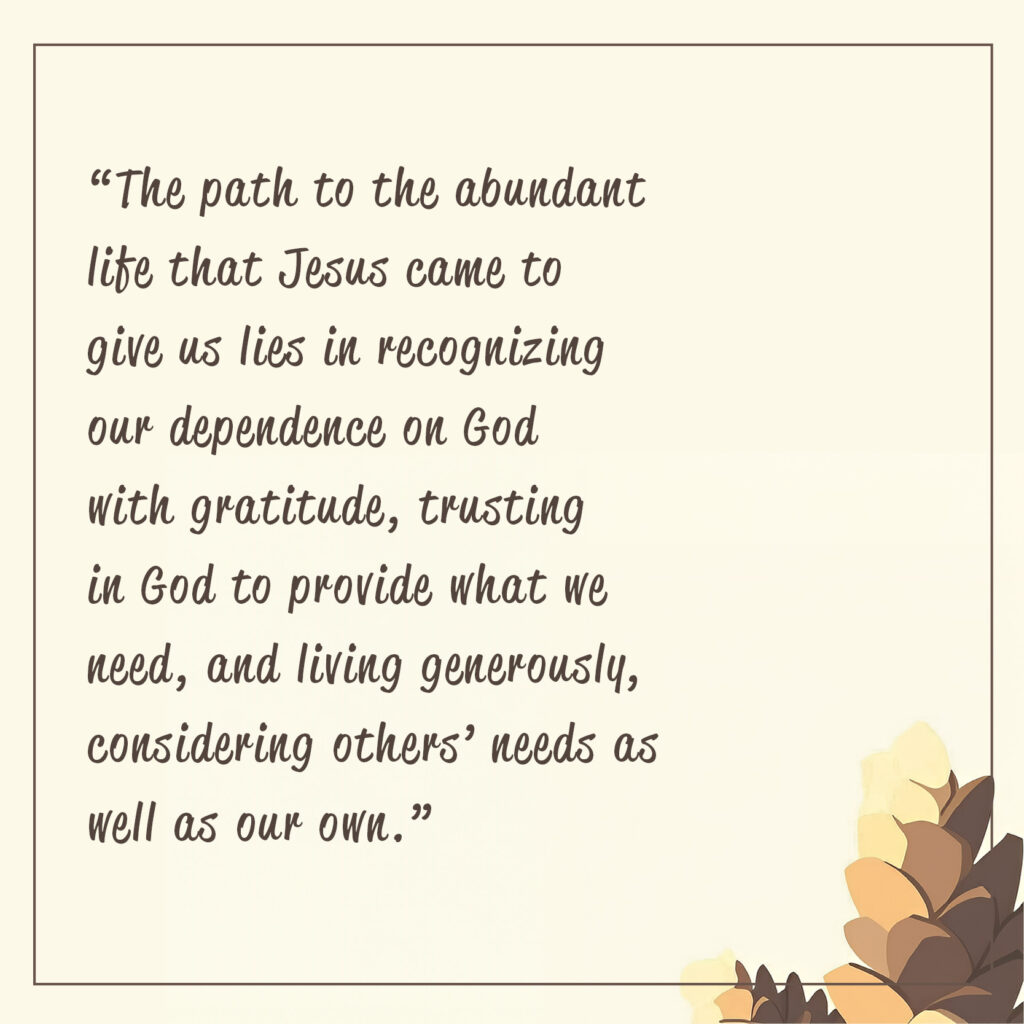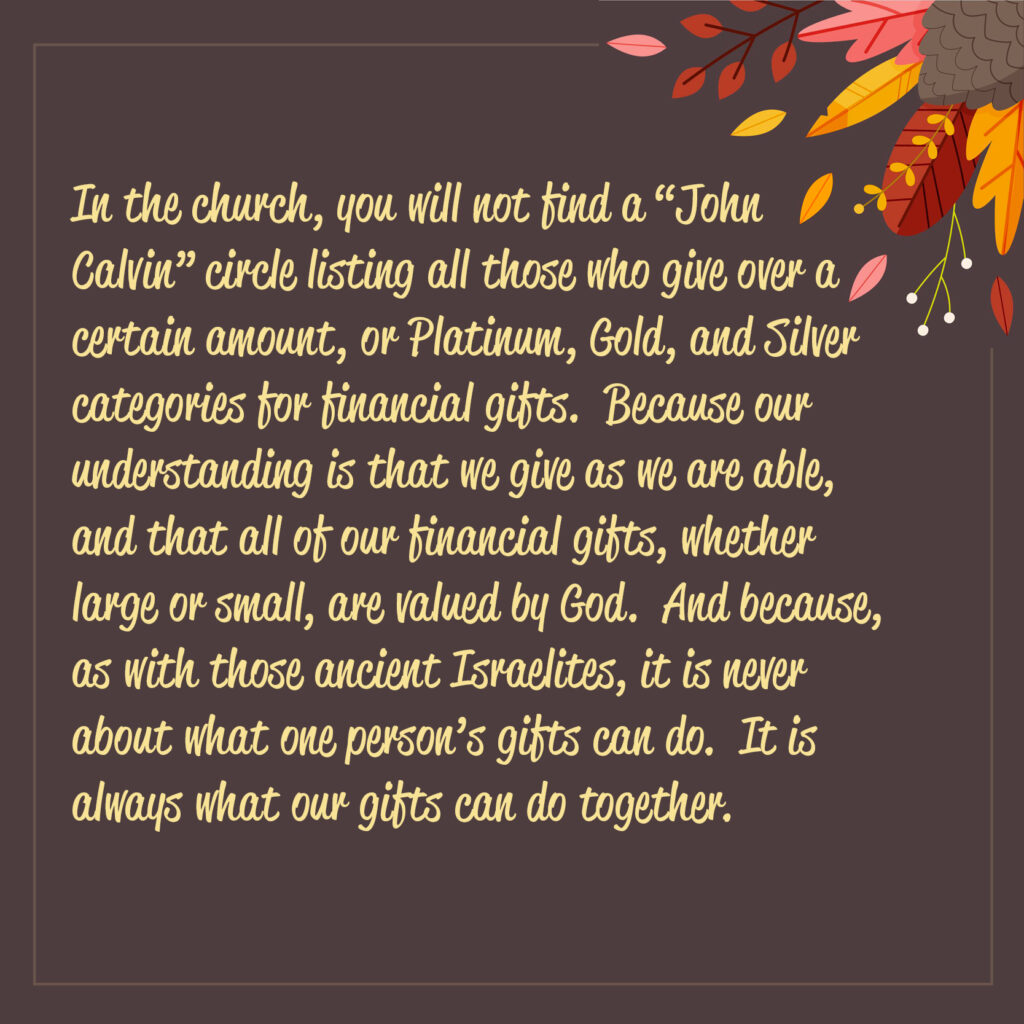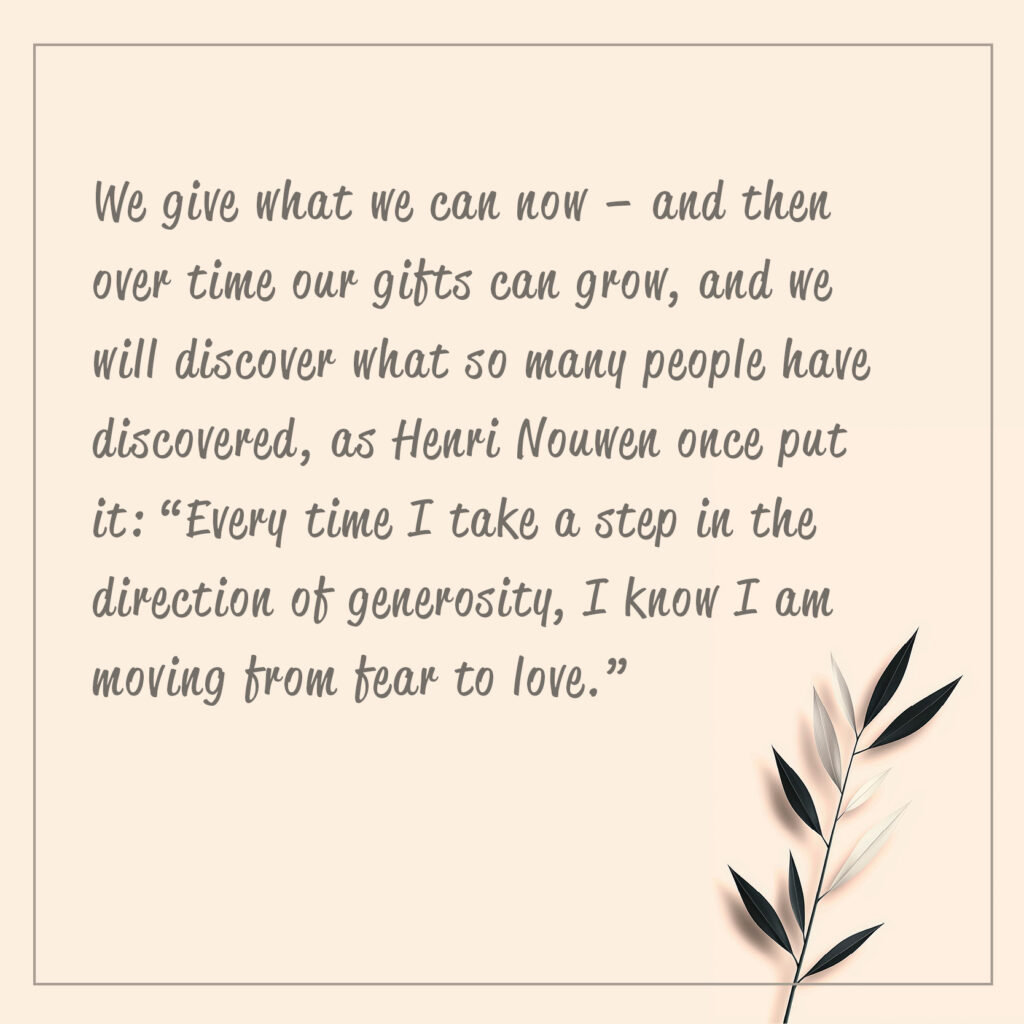Today, we continue our Fall preaching series on the Fruits of the Spirit, the marks of being a Christian. Courage, Peace, Temperance and Self-control, Patience, and Justice lie behind us. Hospitality, Humility, Wisdom, and Gratitude lie ahead of us. During this election season, I have thought what if we were to take this list into our polling booths at local, state, and national elections when we were considering who to vote for? I think we would get a lot better leaders – but I know we would get a lot more pleasant ads. But let us turn from those “what ifs” to today’s fruit of the spirit: Generosity.
Lutheran pastor Alexia Salvatierra shares this story from a Christmas party she was helping to coordinate at a homeless drop-in center: “One of our mentally ill homeless regulars, ‘Debbie,’ came in to the party weeping. She had spent the day sitting in front of a department store in the cold. She had been watching people walking in and out all day, buying presents for their families and friends.” Why was she weeping? It was not that she couldn’t have all the stuff that she saw being carried out of the store by happy Christmas shoppers. It was not that no one would be buying her a present. It was this, as she shared through “gasping sobs:” she did not have the capacity to give a present to anyone else.[i]
What Debbie’s sobs and words remind us is that one of our deepest core needs is to feel like we have something to offer to others. Debbie’s sobs and words also point to another fact about the human condition. We were made by God with a capacity and basic need to give and share what we have with others. Generously. This is what Christ did. This is what the Spirit leads us to do because this is what love does. Jesus told us the key to an abundant life, the key to true joy, meaning, and satisfaction, lies not in receiving but in giving.
Science backs up theology here. “In a study by psychologists…people rated their happiness in the morning. Then, they received a windfall: an envelope with $20. They had to spend it by 5 p.m. and then they rated their happiness again. Would they be happier spending the money on themselves or on others?” Those who spent it on others rather than themselves were significantly happier.[ii]
In turn, a 2010 survey of people in 136 countries found that people who had donated money to charity in the previous month were happier than those who had not. That may not be that surprising but surely this is: the study found that the positive psychological impact of giving money to charity was, on average, equivalent to having their monthly income doubled![iii]
What a contrast the homeless Debbie is to the super-successful farmer in the parable of Jesus that we just heard. The contrast lies not only in their wildly disparate levels of wealth and stability. The contrast also lies in what they understand about the human condition and what it means to be created in the image of God. It is that farmer, and not Debbie, who is the fool.
“The land of a rich man produced abundantly. And he thought to himself, ‘What should I do?’” If you were listening to the parable closely, you did not hear condemnation from Jesus about how the farmer got the money. There is no evidence of theft, fraud, or cheating others. He sounds careful, conservative, and a hard worker – and lucky. The weather is good and his crop yield is far greater than he ever expected.
The problem with the rich farmer, the reason he is a fool, is two-fold. He thinks he is the one who is solely responsible for that surprising crop. There is no place for God in his understanding; it is all about him. And, when he considers what to do with the abundant crop, he never considers other people. He builds more barns to store it all – but only for himself. As one commentator on the passage notes, “He lives completely for himself, he talks to himself, he plans for himself, he congratulates himself.”[iv] He thinks the key to happiness lies in how much he can accumulate. Then he dies and finds out the great truth about death and the accumulation of material goods: you can’t take it with you. No, wonder, Jesus calls him a fool.

The key to life, the path towards joy, purpose, and meaning lies not in how much we can earn, gain, or store away. No, as Jesus explains in other passages in the gospels, it is in losing our lives that we gain it. It is in giving that we receive. The path to the abundant life that Jesus came to give us lies in recognizing our dependence on God with gratitude, trusting in God to provide what we need, and living generously, considering others’ needs as well as our own.
This is the pattern of life illustrated by the Israelites in our other passage, 2 Chronicles 31. The setting is King Hezekiah’s efforts to unite Israel and reform its worship to center once again on God and not the idols that had crept into the Israelites” religion. In chapter 30, there is a great Passover celebration at the Temple in Jerusalem, as the people rededicate themselves to the One whom they worship – the One who delivered their ancestors out of slavery in Egypt.
Then, here in chapter 31, they pull down the sacred poles, the shrines dedicated to the idols in their surrounding culture. Then, under Hezekiah’s leadership, they choose priests and Levites to lead their worship. Finally, the people offer the first – not the leftovers but the first of their crops and other produce of the fields, and a tithe, or tenth, of their cattle and sheep. This offering went to support the Temple and the people who led their worship.
What a contrast the people in Chronicles 31 offer to the foolish farmer in Jesus’ parable. Unlike the farmer, the people acknowledge that all they have is a gift from God. They don’t come to the Temple like the farmer to congratulate themselves. They come to the Temple with hearts filled with gratitude for their many blessings – and they share those blessings with others.
Old Testament or New, generosity is a fruit of the Spirit that springs from a grateful heart. Our giving will not be generous if it done reluctantly or under compulsion. As Paul writes to the church in Corinth, God wants and loves a “cheerful giver,” because such giving springs from the heart and is fueled by a sense of how we been richly blessed by God.
Another contrast between the Israelites in 2 Chronicles and the farmer in Luke 12 is where they place their trust. The farmer puts his trust in himself – and in particular in the possessions he has accumulated that he thinks will enable him to eat, drink, and be merry. In contrast, the Israelites place their trust in God, as evident in taking down the shrines and idols that would encourage them to follow other gods. That trust is also revealed in the offering of the first tenth of their crop and livestock. Another foundation for generous giving is to center our faith on God – and trusting that God will provide what we need.
I recall a man who some year ago described how he tried to emulate those ancient Israelites’ offering of their “first fruits.” “There are a lot of creditors who want a piece of me and my paycheck,” he said. “There are all sorts of other concerns that compete for my attention and my money. But I write out my check to the church first, before I pay anything else. It is my way of saying that I belong to God before anybody else can get a piece of me.”[v]
The offering of the people to God in 2 Chronicles 31 is not only the first fruits, the first of the livestock born that year. They also offered a tithe or tenth of their crop or livestock. Tithing is an idea found throughout the Old Testament. For example, Moses lays down the Law in Leviticus 27: “all tithes from the land, whether the seed from the ground or the fruit from the tree, are the Lord’s; they are holy [set apart] to the Lord.”
Tithing, or giving a tenth: it is not just a practice from a people living in an agrarian economy nearly 3000 years ago. It is a practice that many Christians try to follow even today. I think of those I know who tithed in the congregations I have served. There was the young adult in graduate school who believed in tithing so much that he gave away ten percent of the money he received from his student loan. There was the Firestone factory worker who would cash his paycheck and with his wife put the cash into different envelopes for the mortgage, food, utilities, and the like. But the envelope marked “for God” got ten percent. There was the woman with two children going through a divorce, who continued to tithe despite her life seeming to fall apart, because it was her way of declaring, “I am relying on God to get me through this.” They all served as a model for Kerry and me in our giving as we saw their example and started to try to tithe our income, and any gifts that we received.
Now there is a lot that can go wrong when it comes to the idea of tithing in the church. Too often in some congregations tithing has been set down almost as a requirement for membership and people have felt coerced by church leaders trying to build up the church coffers. Or the tithe can feel like a tax, so that the act of giving can feel legalistic and lifeless, a sharp contrast to the life-giving grace of God and the fruit of the Spirit.
Money is also complicated. For too many people, money is the source of shame because of poor decisions they have made, or because they feel like they have so much less money than others. Or people feel guilt, that they are letting God down, or their church down, or their friends and loved ones. Then the idea of tithing can feel like an unbearable burden that makes us feel unworthy because we cannot give that much.
Now there is a lot that can go wrong – and has gone wrong – when it comes to the practice of tithing in the church. But one thing I can say in response is that I have never known someone who has tithed who has not become less anxious about money and more trusting in God; less guilty about what they can’t do and more grateful for what they can do. I have never known any person who tried to tithe who got rich while doing it. God does not provide profit or prosperity from tithing. But I have found in my own life, and I have heard from others, that they have always had what they needed.
God is gracious and does not lay requirements on us more than we can bear. God loves you and knows your financial needs and concerns. So, if tithing feels like a mountain way too high to climb, just begin where you can, prayerfully and intentionally, offering what you believe God is calling you to give. When we do, giving a proportion or percentage, and not just a flat amount, is a way of being reminded that God calls for equal sacrifice, and not equal amounts in our giving. But give intentionally, and not just what is left over after all of your needs have been take care of.


During my teenaged years and participation in Boy Scouts and Explorers, I did some rock climbing. There weren’t any rock-climbing walls in those days. This was all outside. And I found out something about rock climbing as a gangly teenager: it was hard and I was not very good at it. But rappelling – going down the mountain? That was fun – and with good equipment and a guide who knew what they were doing – it was not that hard.
Except for the first step. The first step was scary. Because to begin, you must go from a vertical position to a horizontal one. In other words, you must lean out with nothing between you and the ground far below. If you don’t lean out parallel to the ground, all that you do is swing back into the rock face and bruise your knees and body. I know that from personal experience. But lean out, and you can bounce down that mountain. And the joy cannot help but bubble up in you.
Leaning out on God and living generously is joyful. Giving is the gift that keeps on giving, keeps on blessing us and others. That is the way God made us. We all have value, we all have something to offer. Friends, this truth is hard-wired into our very being: it is in giving that we will receive – the joy, purpose, and meaning we crave.
[i] Alexia Salvatierra, “Will you give me a drink?” in What Did Jesus Ask?, Elizabeth Dias, ed. (New York: Time Inc. Books, 2015), 224.
[ii] Adam Grant, Give and Take (New York: Penguin Books, 2013), 183.
[iii] Jonathan Sacks, Morality: Restoring the Common Good in Divided Times (New York: Hatchette Books, 2020), 310.
[iv] Fred B. Craddock, Luke (Louisville: John Knox Press, 1990), 163.
[v] Quoted in a sermon by William G. Carter in Speaking of Stewardship: Model Sermons on Money and Possessions, William G. Carter, ed. (Louisville: Geneva Press, 1998), 63.
